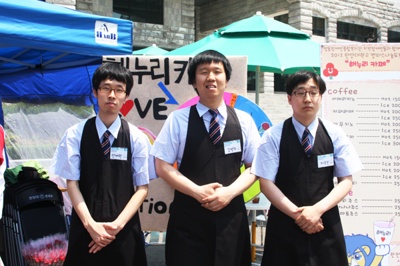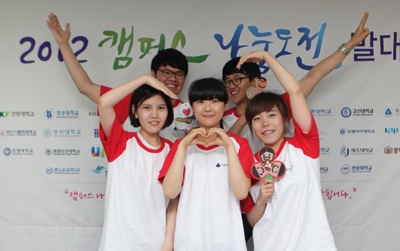
May is often called the season of festivals among universities in Korea. Students can enjoy their youth by holding numerous events, including one-day mini-pubs run by fellow students, and even treat celebrity visits to campus as festive occasions. However, critical voices have also been raised against the pleasure-seeking atmosphere of university festivals. Unlike these eating and drinking festivals, the Campus Sharing Festival campaign exhorts students to enjoy festivals in a special way: Sharing.
As a campaign pursued by the Community Chest of Korea (CCK), the Campus Sharing Festival started in 2008 to help university students experience the pleasure of sharing through voluntary participation during each university’s festival. Participants in this campaign both plan and prepare special events, bazaars, and fund raisings based on their own unique ideas, earning revenues from all these. The money collected is used in donations for the public good or for people in need. In 2011, around 17 million won was donated by participants.
“As festivals are important for students, we wanted to make this one a time when students can learn to enjoy sharing with others rather than just experience a one-off event,” said Lee Jae-eun, an officer of the CCK. “We wanted to find a way for students, who will become potential donators when they graduate and go out into society, to more easily experience sharing.
The number of universities participating in the campaign is gradually increasing every year, compared to 2008, when only five took part. Twenty universities participated in 2009, 23 in 2010, 26 in 2011, and a total of 29 universities nationwide in 2012. Ewha, however, does not take part in the campaign.

Yonsei University has participated every year since the launching of the Campus Sharing Festival in 2008. Working in combination with Korea Food for the Hungry International, Yonsei Volunteer Center and Yonsei Volunteer Coordinator designed the “Hanoi Miso Project” in 2011 to support Vietnam’s well-drilling projects. Volunteer workers encouraged students to donate money by skipping a meal and thereby help send books and food to Vietnam. Also, a booth was prepared where students could learn about Life Straws, a portable water purifier. Moreover, a project in 2012 named “Nanoom Date” was held by 50 couples who designed their own T-shirts for kids in Vietnam and for themselves.
Hanyang University has the honor of having participated five consecutive years, ever since the campaign began, receiving the grand prize the first year (2008) by showing a successful promotion activity. The promoters collected private donations from both faculty and students and held a charity bazaar and auction to raise funds for the construction of a library in the Village of Reconciliation in Asan as one of the projects by Habitat for Humanity. The actor Jung Il-woo presided over the auction as a student of Hanyang in 2008.
In 2012, not only have the greatest number of universities joined in, the diversity and completeness of the programs directed by students have increased as well.
Social welfare majors from the University of Incheon recently worked together with the Incheon Community Rehabilitation Center and invited disabled baristas from the center’s vocational rehabilitation team to help with the festival held from May 21 to 24. While the baristas brewed and sold coffee, other activities, such as making Braille cell phone accessories or conducting psychological examinations of students, were pursued on the side. Social Network Services were activated to encourage participation.
“We hope students were able to think about sharing and feel more committed to it through the experience,” Kim Yeon-ji (University of Incheon, 3) said. “By communicating with the handicapped, students are also expected to increase their awareness of disability.”
Hanyang University has also worked closely with the Seongdong Community Rehabilitation Center since 2009, helping the disabled with hands-on vocational training by promoting and opening Haenury Café, a café run by workers with autism. Several baristas who have participated in the festival now work in the Haenury Café located at Gwanghwamun in Seoul.
“Small cups of drinks could add up to a huge donation for neighbors,” Yeon Kyu-hyun (Hanyang University, 4) said. “In that sense, the campaign is meaningful because it instills a feeling of pride among students and a chance to honor the school’s reputation through donations.”
Students view the campaign from a positive perspective.
“I am happy to see this movement opening a way for a new festival concept, by which I mean enjoying a festival through sharing it with neighbors and society,” Kim Nam-young (Chung-Ang University, 2) said.
The CCK is planning to expand the base of sharing culture after the festival.
“As long as the festival exists, we will also continue holding the campaign,” Lee said. “We hope this campaign will be an opportunity to discover university students’ smart and insightful ideas concerning sharing.”

